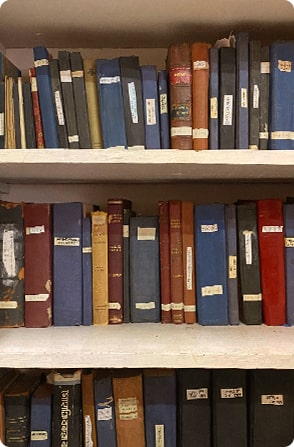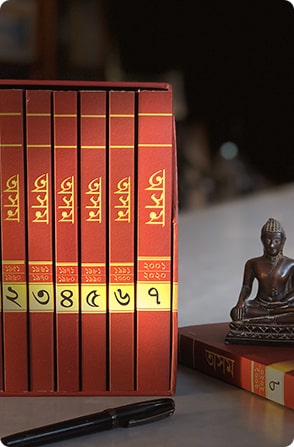Nanda Talukdar Foundation
A passionate journey of entrepreneurial zeal from a modest beginning with making public the personal library of renowned litterateur Late Nanda Talukdar in 1996, the Nanda Talukdar Foundation(NTF) has come a long way in the past 25 years to emerge as a name to reckon with in Assam, especially in the sphere of Publication, Contemporary Social History Research, Social Audit, Media Advocacy and Ground level intervention .


Today the Nanda Talukdar Foundation has emerged a focal point of pioneering contemporary social history, advocacy as well as intervention and their area of activities is spread both horizontally and vertically first in Assam and then slowly in other parts of the North East India.
The Roots
For the Assamese literature, the library of the Nanda Talukdar Foundation is considered as one of the final frontiers. No research on Assamese literature in the past five decades have been completed without the Foundation's help. The Foundation is the treasure house of the Assamese literature of the early nineteenth century to the twentieth century, where scientifically the documents, journals and books are preserved through digitalization as well as conventional method.

Systematic research are being carried out on the Assamese literature beside helping almost every single major publication of the Assamese literature in the past quarter of the century. The entire collection was the life long creation of Late Nanda Talukdar who died in a tragic car accident in 1983 but his immediate family carried on his work and gave the shape of the Foundation making it open for every researchers of the Assamese literature. As the years have passed by, so is the role of the foundation, it has now grown to an institution which has specialized in doing social audit on the micro credit and rural economy besides highlighting the success stories both through academic dissection as well publication targeting ordinary masses. It has also travelled to grass root intervention and msss highway tree plantation on mission mode to make a direct intervention as well as strengthen the institution.
The Journey
Nanda Talukdar passed away in 1983 in a tragic car accident leaving behind a rich library of rare literature dating back up to the 19th century and starting years of the 20th century. His son Mrinal took over the responsibility of preservation of the library and continue with the efforts of his father. People around started to see Mrinal’s effort as a pioneering one in preservation of historical literature. This actually came as a solution for those who had literary contents from the yesteryears at their hand but were searching for ways of preserving them. With these turn of events and Mrinal’s relentless passion for the library, the Nanda Talukdar Foundation was formed in 1996. In 1998 the library was shifted to “Harabala Surabala” Road provided by renowned writer Dr. Dhrubajyoti Borah, who was running the North East Foundation from that premises, because of space constraint. By 2002 the Foundation started the process of Digitization of the contents in the library with initial help and support from Mrinal’s friends, relatives and organizations like OIL etc. In particular national Archives, after in-depth scrutiny, selected the Foundation as a partner in preservation of rare manuscripts and came in with a grant of 60,000/-. This emboldened the Foundation in their cause of preservation of rare literature and facilitating interested researchers from all over the country. However, the high cost of digital media and also hardware and software at that point of time saw Mrinal struggling in the financial front. In addition to this there was the increasing cost of establishment and infrastructure needed to sustain the ongoing activities of research and documentation. Also there were unforeseen constraints like the floods on 2004 that caused damage to the books. Not to be deterred by challenges and with support from family members Mrinal poured all his income into the Foundation and expanded his parental house with a conference facility, documentation room and a humble resting facility for researchers. The library was shifted back in 2005.
Project Assam
One of the most pioneering project of the NTF was to come out with a cofee table book on Assam using equity model spending a stupendous Rs 13,00,000 in 2006-2007. It was a monumental effort as never ever in the annals of Assam's publication history something of that level was targeted. A few were done with the support of the Government institution but project Assam was different, a pinnacle of world standard publication to showcase Assam with that Coffee Table book Assam. The book was launched at Guwahati by the then Chief Minister Tarun Gogoi and at Delhi by the Prime Minister Dr Manmohan Singh and then it was launched at India House, London as well as in Hongkong.
The urge behind:
Assam had always been wrongly projected. The true spirit of Assam lies in her beauty and serenity. Each committed soul of the state always feels the urge of putting this right. Mrinal was no exception to this. He not only carried this dream in his heart but actually got into action for realizing it. Given his passionate involvement with the library left behind by his father and the long years of journalistic experience, print media came as a natural choice to him. How and in what form was the big question at hand now.
The concept: Publication of a first ever coffee book on ASSAM in an entrepreneurial basis. This coffee book would serve as a souvenir of life time for people around the world.
Rollout strategy: Mrinal dared to think big. At that time, any standard publication in Assam would cost in the tune of 50000/-. He aimed at an international diaspora for a likely market of the coffee book, but with a difference. Instead of resorting to the conventional ways of marketing a product, it was decided to keep a low profile. Instead the book would be strategically placed in international air terminuses all around the world (further details on how the book was marketed would strengthen the case). The book would be priced in such a manner that it would be a viable keep for people from outside the state and would be accepted as a ceremonial item for the local diaspora. The contents of the book would itself speak volumes of it’s purpose. A ball point estimation of such a publication came to be around 13,00,000/- for initial 1000 copies (further details on how this estimation was made would strengthen the case). For this Mrinal was forced to reach out of the Foundation. To where? He knew for sure this has to come chiefly from individuals.
Action and implementation: With NTF as the chief promoter with 17% stakes in the project, Mrinal went for an IPO amongst a select group of people. There were 11 respondents, including himself that covered 70% stakes of the project while the remaining 13% was taken as a loan from SBI. The book was priced at 2500/-
Making way for sustenance: The project grossed around 10,00,000/- of revenue in the initial year which was divided amongst the stakeholders. Three of the stakeholders, including Mrinal returned their shares and it was added to NTFs reserves. This was up to the tune of 4,00,000/-. This marked the start of the sustainability era of the Foundation.
IIM, Shillong Study
The unique equity model of publication was later studied by IIM Shillong as a new way of entrepreneurship and here is an excerpt:
By now, NTF has become established in the region as a pioneer in digital preservation of historical literature. Seeing his initial passion coming true, Mrinal thought of venturing into something new. He has been a journalist by profession since 1989. With this vast experience behind him, he thought of entering the field of publication. He started thinking hard on how to differentiate his publication venture from the existing ones. The concept of Project Assam came during this phase.
Mrinal thought of a coffee book that would reflect Assam in all her serenity and beauty. This would serve as a souvenir of life time to people visiting Assam from all around the world. Also, if succeeded, this would again be a pioneering venture in the region. After much deliberations on his conceptualization of the coffee book, the estimated cost of publication of 1000 copies came to be around 13,00000/-. Though Mrinal had the Foundation behind him, this estimation was beyond what it could possibly cover.
At this juncture, deliberations are required on how Mrinal should go further ahead with Project Assam. Should some other publication house that could bear the cost be approached while the Foundation does the content development? If so, then is there any element of risk that Mrinal needs to take care of before entering into a negotiation? Or could Mrinal think of some equity model for the book where different stakeholders are invited to participate? In such a case, how will Project Assam fit into the Foundation so that both the Project is also viable and the Foundation also earn enough for future growth? Will the Foundation require a different orientation from the current status of an NGO?
NTF steps into it’s most significant entrepreneurial venture uptil now, the Project Assam – Publication of a Coffee Book on Assam, a dream conceptualized and cherished by Mrinal for long. The book took up almost the entire energy of the Foundation. It was decided that it would be published without any institutional or government support. The book was published by NTF itself with a innovative Equity Ownership model. The Foundation took the responsibility of the promoter for the book with 17% stake. 70% stakes were taken up by 11 committed individuals through an internal IPO while the remaining 13% were covered by bank loans. The dividends from Project Assam were handsome and not only formed the core of the Revenue model of the Foundation ( as discussed later) but also paved the way for a sustainable future for running the operational activities of the Foundation.
The innovative Corporate Ownership model of the book found appreciators in the likes of the Assam Chief Minister during it’s launch and the Prime Minister during the ceremonial presentation. International launch of the book at Hongkong and subsequently in the House of Commons in London saw the acceptability of the unique model at the global level.
Growing Infrastructure
- 2004-A new building was constructed to house the library and research room
- 2006-Computers and peripherals were added
- 2009-More computers and peripherals were added for the researchers
- 2010-Annexe was added to house the main office
- 2011- Guest rooms for long term researchers added
